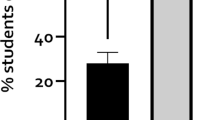Abstract
The qualitative study on which this article is based examined key individuals’ perceptions, both within a research university community and beyond in its external governing board, of how to improve benchmarking as an accountability method in higher education. Differing understanding of benchmarking revealed practical implications for using it as an accountability tool. A change model is presented for enhancing the effectiveness of benchmarking in higher education communities.
Similar content being viewed by others
References
Alexander, K. (1996). The Value of an Education. In D. W. Brenemam, L. L. Leslie, and R. E. Anderson (Eds.), ASHE reader on finance in higher education (pp. 85–111). Needham Heights, MA: Simon & Schuster Custom Publishing.
APQC (2004). Benchmarking methodology. Retrieved May 11, 2004, from http://www.apqc.org/portal/apqc/site/generic2?path=/site/benchmarking/benchmarking_methodology.jhtml.
Arnone, M. (2004). New commission on college accountability debates standards, rewards, and punishments. Daily Report from The Chronicle of Higher Education. Retrieved May 11, 2004 from http://chronicle.com/daily/2004/05/2004051101n.htm.
Barak, R. J., & Kniker, C. R. (2002). Benchmarking by state higher education boards. In B. E. Bender and J. H.Schuh (Eds.), Using benchmarking to inform practice in higher education. New directions for higher education, Vol. 118 (pp. 93–102). San Francisco, CA: Jossey-Bass.
Carnegie Foundation for the Advancement of Teaching. (2000). Category definitions. Retrieved March 24, 2004 from http://www.carnegiefoundation.org/ Classification/CIHE2000/defNotes/Definitions.htm.
Downey, J. (1995). The university as trinity: Balancing corporation, collegium, and communiity. Louise McBee Lecture. Athens, GA: The University of Georgia, Institute of Higher Education.
Kuchapski, R. (1997). Conceptualizing accountability: A liberal framework. In R. J. S. Macpherson (Ed.), The politics of accountability: Educative and international perspectives (pp. 185–196). Thousand Oaks, CA: Corwin Press.
Kuh, G. D. (2003). What we’re learning about student engagement from NSSE. Change, 24–32.
Mancuso, S. (2001). Adult-centered practices: Benchmarking study in higher education. Innovative higher education, 25, 165–181.
Miller, Z. (2000, May). A cautionary critique: The winter of despair or the spring of hope? Paper presented at the conference on Accountability and Financial Support of Public Higher Education, University of Georgia, Athens, GA.
Nettles, M. T., Cole, J. J. K., & Sharp, S. (1997). Benchmarking assessment. Assessment of teaching and learning in higher education and public accountability: State governing, coordinating board & regional accreditation association policies and practices. Stanford, CA: National Center for Postsecondary Improvement.
Peshkin, A. (1993). The goodness of qualitative research. Educational Researcher, 22(2), 23–29.
Simpson, E. G., Jr. (2001). Engaging the public policy agenda: A conference on accountability and financial support of public higher education. Journal of Higher Education Outreach and Engagement, 6(3), 5–22.
Simpson, R. D. (2002). How higher education differs from corporate America. Innovative Higher Education, 27, 1–3.
Smith, H., Armstrong, M., & Brown, S. (1999). Benchmarking and threshold standards in higher education. London, England: Kogan Page Limited.
Zairi, M. (1996). Effective benchmarking: Learning from the best. London, England: Chapman & Hall.
Additional information
Sue D. Achtemeier received the B.A. in mathematics and computer science with High Honors and the M.S. in mathematics from Florida State University and the Ph.D. in Higher Education from the University of Georgia. She has held teaching positions in Illinois and Georgia and is now Assistant Director for Institutional Effectiveness for the University of Georgia with particular interest in accreditation and accountability. Ronald D. Simpson is Professor Emeritus of Higher Education and Science Education and Director Emeritus of the Office of Instructional Support and Development at the University of Georgia. He holds degrees in the biological sciences and in science education from the University of Tennessee and the University of Georgia and continues to teach and advise doctoral students in UGA’s Institute of Higher Education.
Rights and permissions
About this article
Cite this article
Achtemeier, S.D., Simpson, R.D. Practical Considerations When Using Benchmarking for Accountability in Higher Education. Innov High Educ 30, 117–128 (2005). https://doi.org/10.1007/s10755-005-5014-3
Issue Date:
DOI: https://doi.org/10.1007/s10755-005-5014-3




